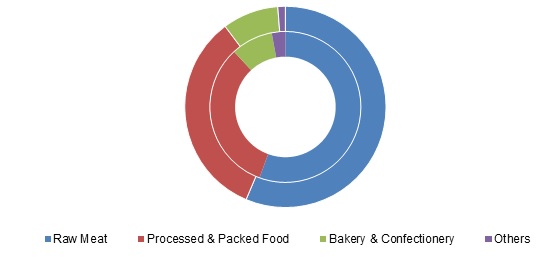The Halal Food market growth is primarily due to increase in Muslim populations and their rising annual spending on food. This has created a surge in demand for halal food & beverage products. Increasing demand has also compelled market players to engage in authentic and branded products. Presently, consumers are exhibiting growing interest in halal industry. This is primarily due to the increasing consumer awareness about the nutritional and hygiene advantages, and improving lifestyles as a result of increasing disposable income. These products being processed and packed with much higher regulatory compliance compared conventional food products are gaining significantly popularity. Basically, they do not contain contents or ingredients that are against Islamic beliefs.
The global Halal Food Market is anticipated to reach USD 922.53 billion by 2026 according to a new study published by Polaris Market Research.
Get Sample Copy @ https://www.polarismarketresearch.com/industry-analysis/halal-food-market/request-for-sample
Some of the leading industry participants in the Halal Food market include Cleone Foods, Prima Agri-Products, Cargill, Kawan Foods, Janan Meat, Saffron Road Food, Dagang Halal, QL Foods, Al Islami Foods and Nestle.
Halal foods are expected to be produced, packaged, stored, and distributed as per Islamic teachings. Moreover, these products are considered to be safe, clean, and highly nutritional. The significant growth in Muslim populations across the globe is expected to offer immense opportunities to Halal Food market. In addition, the rapidly accelerating economic power of Islamic countries is anticipated to largely influence them to spend additional money on the branded products.
The growing issues over the absence of proper regulatory framework to assure the authenticity of these products might be a restraint to the commercially produced halal food. The industry can be considered as a fragmented one and the absence of standardized regularizations has repressed the mainstream F&B participants from venturing this section of the worldwide Halal Food market. However, the number of small scale companies meeting the needs of the local populations has been increasing significantly.
Get Discount Offer @ https://www.polarismarketresearch.com/industry-analysis/halal-food-market/request-for-discount-pricing
Low level of awareness about the presence of authentic halal food brands is acting as a challenge to the industry. As a consequence, the industry is not experiencing demands to its full potential as expected. Moreover, halal authentic issues within the sector are considered quiet minor among consumer. Thus, this requires manufacturers to improve their marketing strategies and production facilities. Furthermore, it becomes difficult to understand consumer perspective about halal food & beverage brands.
The Asia Pacific Halal Food market is anticipated to dominate the global market by 2026, owing to the presence of emerging nations such as India, Indonesia, Malaysia, Bangladesh, Maldives, and Pakistan. These nations have significant population that follows Islamic beliefs. Moreover, the rising economic conditions in the region provides an opportunity for the foreign players to start of their production facilities, thus offering cost effective products the consumers in the region.
Buy Now @ https://www.polarismarketresearch.com/checkouts/4491
